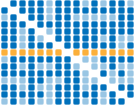The page of Bornemisza Péter, English biography
Biography
Born February 22, 1535 in Pest; died before June 24, 1584 in Rárbok. Prose writer; Lutheran minister and superintendent. Descendant of middle-class family, whose prosperity was much reduced by Turkish invasions. Orphaned in 1541, and brought up in Felső-Vidék. Studied in Kassa 1548-1553. First sought out Hungarian cities and cultural centers and later attended universities in Italy, France, and Germany (1557-1559). Melanchthon's student in Wittenberg. On return engaged in printing business in Kassa and Debrecen. Became Lutheran clergyman in 1564 and, with certain interruptions, served Balassi family and tutored Bálint Balassi (q.v.) in Zólyom. Charged with celebrating Mass with bread in 1564. In Ungvár in 1565 on diplomatic mission to army of Menyhért Balassi and Lázár Schwendi. Known to be in Zólyom in 1567. Appointed Superintendent of Mátyusföld in 1570. Minister in Galgócz in 1572 and preacher in Sempte by 1573. Began literary activity with Hungarian reworking of Sophocles' Elektra (1558). His most productive years began in 1570 with publications issued regularly from his own press at Sempte. Seized for concepts expressed in Ördögi kísértetek and imprisoned in Vienna. Escaped after three weeks and returned to Sempte. Driven from Sempte in January 1579. Went to Beczkóvár and from there to Detrekővár, where he again came under protection of Balassi family. Completed Énekek három rendbe in 1582 and Prédikációk, a collection of his new sermons, in 1584.
Generally considered to be the most cultured and humanistically erudite Protestant preacher-writer in 16th-century Hungary: he united contemporary Italian-German culture and knowledge of Greek and Latin classics with Hungarian learning.
Some of his poems have been translated into English and Russian.
http://www.mek.iif.hu/porta/szint/egyeb/katalog/hunauth/html/f04.htm



